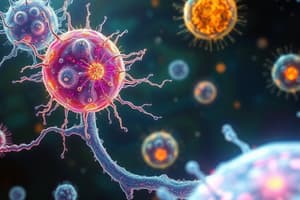Podcast
Questions and Answers
What is the fluid-filled space inside the cell called?
What is the fluid-filled space inside the cell called?
- Cytoplasm (correct)
- Ribosomes
- Nucleus
- Mitochondria
Which type of cell lacks a nucleus?
Which type of cell lacks a nucleus?
- Ribosomal cell
- Prokaryotic cell (correct)
- Eukaryotic cell
- Mitochondrial cell
Which organelle contains the genetic material of the cell?
Which organelle contains the genetic material of the cell?
- Ribosomes
- Nucleus (correct)
- Mitochondria
- Cytoplasm
What type of cells have membrane-bounded compartments and organelles?
What type of cells have membrane-bounded compartments and organelles?
What has had a profound impact on our understanding of biology?
What has had a profound impact on our understanding of biology?
What did Robert Hooke observe in 1665 that led to the realization of cells as the fundamental building blocks of all living things?
What did Robert Hooke observe in 1665 that led to the realization of cells as the fundamental building blocks of all living things?
According to cell theory, what is the basic unit of structure and function in all living organisms?
According to cell theory, what is the basic unit of structure and function in all living organisms?
From where do living cells arise according to cell theory?
From where do living cells arise according to cell theory?
What is the main focus of cell biology?
What is the main focus of cell biology?
Which part of the cell acts as a barrier between the cell and its environment?
Which part of the cell acts as a barrier between the cell and its environment?
What did improvements in microscopes and staining techniques help scientists discover about cells?
What did improvements in microscopes and staining techniques help scientists discover about cells?
Flashcards are hidden until you start studying
Study Notes
Cells are the basic units of life. They are the smallest units that can carry out the processes of life, and all organisms are made up of one or more cells. The discovery of cells dates back to 1665 when Robert Hooke observed the structure of a plant cell using a microscope, noting that it resembled a honeycomb with small, repeating units. This observation led to the realization that cells are the fundamental building blocks of all living things.
In the 1830s, two German scientists, Theodor Schwann and Matthias Jakob Schleiden, provided the first clear definition of the cell and established cell theory. Cell theory states that all living organisms are made up of one or more cells, which is the basic unit of structure and function. It also established that cells reproduce by division, and living cells arise only from other living cells.
The study of cells, known as cell biology, focuses on understanding cell structure and function. It covers various subfields, including the study of cell energy, cell genetics, subcellular compartments, cell communication and signaling, and the cell cycle. Improvements in microscopes and staining techniques over the centuries have allowed scientists to study cells in more detail, revealing the complex structures and mechanisms within them.
Cells are surrounded by a plasma membrane, which acts as a barrier between the cell and its environment. Inside the cell, there is a fluid-filled space called the cytoplasm, where organelles such as ribosomes and mitochondria perform various functions. The nucleus, which contains the genetic material of the cell, is another important structure.
Cells can be categorized as prokaryotes (lacking a nucleus) or eukaryotes (containing a nucleus). Prokaryotes are simpler cells found in bacteria, while eukaryotes are more complex and are found in organisms such as plants and animals. Eukaryotes have membrane-bounded compartments and organelles that perform specific functions.
The discovery of cells and the principles of cell theory have had a profound impact on our understanding of biology. They have laid the foundation for many scientific advancements and continue to be the focus of research in various fields, including medicine, genetics, and molecular biology.
Studying That Suits You
Use AI to generate personalized quizzes and flashcards to suit your learning preferences.




